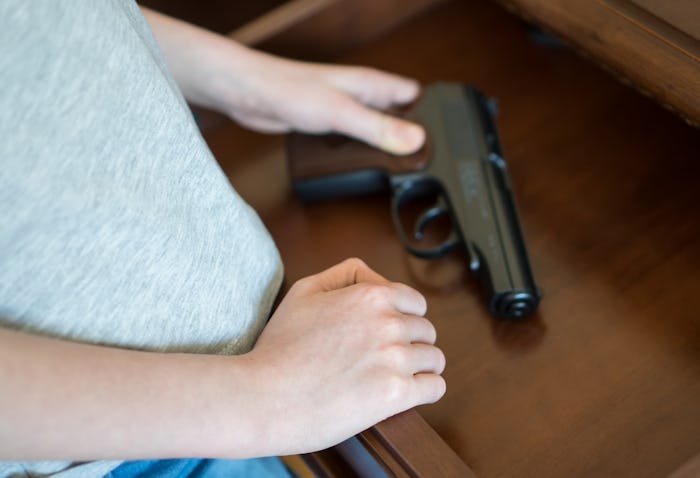Life
The AAP Says You Should Talk To Your Kids About Guns Before A Playdate
If you're a parent who doesn't own a gun, it may not even occur to you that the parents of your children's friends might keep guns in their homes. But the truth is that about one-third of American families have guns stored in their homes — and given the number of children and teens who are either injured or killed by firearms on a regular basis, gun safety simply isn't something that's worth taking lightly. That's why — in honor of Ask Day on Thursday — the American Academy of Pediatrics says that you should talk to your kids about guns before they go to a friend's house, and that you shouldn't be afraid to ask the child's parents how they store their guns. Because while you may take great care to lock up your guns — or while you may not have any at all — it can be incredibly dangerous to assume that other parents do the same.
Few parents would ever want to even consider that their children could have access to a gun while at a friend's house, but it's a reality: according to the AAP, "nearly 1.7 million children live in a home with a loaded, unlocked gun," and firearm injuries are now the third leading cause of death for children in the United States.
It's one of the reasons why it's so vitally important that parents who do keep guns in their home are responsible about storing them: guns and ammunition should be securely locked and stored — away from each other — and children shouldn't have any way to gain access. But it's also why kids need to be taught to stay away from guns, and why it's not even sort of inappropriate to ask other parents about their gun storage habits.
Gun safety educator Jenny Stadelmann told the AAP that parents should always inquire about gun safety whenever their child is visiting a home they've never been to before. What should you ask specifically? Stadelmann recommends first asking whether or not the parent has a firearm in the house, and then asking how they are stored. She explained, "I focus on the storage, not on the firearm," which sounds like a pretty good approach if you want to avoid an uncomfortable confrontation over gun ownership. And if you aren't comfortable with the response, the AAP suggests inviting your child's playmate to your home instead.
Honestly, just thinking about asking another parent I don't know whether or not they keep their guns properly secured makes me uncomfortable. But facing that temporary discomfort certainly seems like a small price to pay to keep your child safe — especially since gun deaths and injuries aren't uncommon. According to Everytown for Gun Safety, seven children and teens are killed by guns in the United States every day on average, and an unintentional shooting involving a child occurs roughly ever 34 hours.
What's more though, is that among those children who die from unintentional shootings, a whopping 89 percent die in the home specifically because they were playing with a loaded gun in their parent’s (or the gun owner's) absence, according to the Children's Hospital of Philadelphia (CHOP). In other words, the majority of those deaths could have been prevented had the children not had the ability to access the guns in the first place. And while that certainly applies to proper locking and storage, statistically, just having a gun in the house in general increases a child's risk: those who died from accidental shootings were "more than three times as likely to have had a firearm in their home, according to CHOP.
Another alarming reality? Gun-owning parents who think their children are unable to access their firearms are often wrong. According to the Brady Campaign, roughly 22 percent of children of parents who reported that their children had never handled a gun at home said that, actually, they had. And even when parents believed they had properly secured their guns, their children claimed to either "[know] the combination or where the key was kept." As for teens who died by suicide using a firearm? 82 percent of them obtained the gun from their home.
In other words, as much as we might not want to imagine our children could ever get their hands on a gun — either at home or in someone else's — the research says it's a reality that shouldn't be ignored. And it means that talking to your children about gun safety, as well as being upfront and asking other parents directly, is an important way to keep your child safe.
